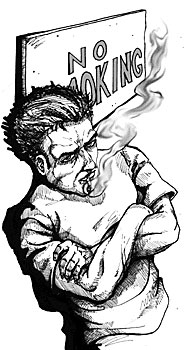
Illustration by Arnie Bermudez
|
|
Arizona Daily Wildcat
Thursday, January 22, 2004
Print this
Should the rest of Arizona be forced to follow Tempe's lead and ban smoking from bars altogether?
Free to be healthy
In America, we place personal liberty at a premium. Most individuals strongly believe in the importance of our constitutional rights. However, when one's choices infringe on the well-being of other citizens, a line must be drawn between what is permissible and what is prohibited.
Smoking will kill more than 440,000 Americans this year - more than all terrorist acts combined. But the real tragedy occurs when people who do not smoke develop lung cancer or other ailments as a result of those who are so inconsiderate as to smoke in their presence.
Rep. Linda Lopez, D-Tucson, will propose a bill soon that would ban smoking in Arizona's restaurants and bars, as well as other buildings open to or staffed by the public. Similar bans and restrictions are already in place in several Arizona cities, most notably in the UA's rival college town, Tempe.
Restaurant and bar owners are already protesting the legislation, claiming that they will lose customers as a result. On the contrary, Lopez's bill is just as likely to increase business: One's appetite is ruined when free-floating carcinogens mix with the aroma of a delightful meal. In this area, ASU trumps the UA, providing a far more enjoyable dining experience.
Customers aren't the only people who suffer when other patrons light up. Restaurant and bar employees who had previously been forced to inhale second-hand smoke would appreciate the health benefits of a smoking ban.
 |
|
Jennifer Kursman
Columnist
|
|
|
According to Lopez's press release, a study at the University of California determined that before California's smoking ban, 75 percent of bartenders who worked an average of 28 hours per week "suffered from lung ailments; after the law, 60 percent had no lung symptoms at all and they had 4 percent better lung capacity."
Smoking is not a personal issue; it is a public health issue. As Lopez told me yesterday, "Smoking has nothing to do with anyone's right to smoke, but it has everything to do with health and safety for thousands of Arizonans."
Lopez is hardly going out on a limb here. A poll conducted by The Arizona Republic last month found that 73 percent of Arizonans would support a smoking ban. Yesterday, a poll taken by the Daily Wildcat found that 70 percent want Tucson's bars to be smoke-free.
In addition, many restaurant and bar owners support the ban as an equalizer among businesses that were previously competing for customers. "If there was a very strict state ban passed ... everybody would be on a level playing field," said Mike Cuneo, owner of two bars in the Phoenix area. Lopez also told me she has plans to lobby the Native American leaders of Arizona's reservations to ensure that smoking laws will become uniform throughout the state. "Our hope is that they would want to create a safe environment for their staff members as well," she told the Republic.
Individuals should have the right to pursue personal happiness. But the Constitution does not contain a clause stating, "You have the right to kill other people with your noxious fumes." Just governments strive to deliver the greatest good to the greatest number, and Lopez's bill is a classic example of this tenet. A ban on smoking can only benefit the people of Arizona.
Jennifer Kursman wishes her best friend would stop smoking. Go to smokefreeaz.org for more information.
Kursman is a biochemistry freshman and she can be reached at letters@wildcat.arizona.edu.
What were they smoking?
Let me get this straight: Linda Lopez, a Democratic legislator from Tucson, wants to take a law from Tempe, which is credited with single-handedly closing numerous establishments, and make it statewide? It's surprising that Rep. Lopez would propose a bill like this, considering that she must have been smoking something when she got the idea. This bill has "bad idea" written all over it.
First, let's consider the fact that business owners have rights, like the right to allow the use of a perfectly legal substance in a way that does not affect other patrons. Essentially, this proposal would make it illegal to smoke in public places, including bars and restaurants. If it's like the Tempe law, it would allow smoking on outdoor patios, but only if people don't have to walk by them to get into the establishment. Smoking inside a bar or restaurant, even in a separate room with isolated ventilation, would not be allowed. As I recall, tobacco is still legal, right? You couldn't tell by looking at this bill.
According to the Jan. 16 issue of the Wildcat, Lopez said, "Lots of people don't have a choice about where they work, especially with the state of the economy. Bar workers deserve a safe working environment."
As I understand this statement, the premise is that with the economy down, people have to take what work they can find. That sounds reasonable. What isn't reasonable is the assumption that waiting tables is the only job available and for which people are qualified. Even with a recovering economy, there are plenty of other jobs available - not to mention the fact that if you're qualified to carry drinks, you're qualified for numerous other jobs.
It seems to me that if someone can spend eight hours walking around, making change, taking orders and carrying heavy items, he or she would have the basic mental and physical skills to do any number of other things.
Now let's consider the economic impact. Numerous bars in Tempe have closed since this law was enacted there. Basically, people who want to smoke simply take their business to another nearby city, like Phoenix, Scottsdale or Mesa.
Proponents of the smoking ban claim that if we were to pass the law statewide, we would solve this problem because smokers would have no alternative. Wrong again. The proposed smoking ban would not apply to Indian reservations. This means that smokers would be able to head out to casinos on the reservations to enjoy their sin sticks. The end result is about the same as we've seen in Tempe.
If tobacco is really that much of a threat to the public health, and I'm not saying it isn't, then we ought to just go ahead and make it illegal.
But as long as we're willing to tolerate its use, we should have reasonable measures to allow people to smoke without disturbing others. Mesa has a very reasonable smoking law.
If an establishment wants to allow smoking, it must have a physically separated area for smokers with an isolated ventilation system. I would suggest Lopez take a look at it.
Tim Belshe is not a smoker. He is a systems engineering junior and can be reached at letters@wildcat.arizona.edu.
